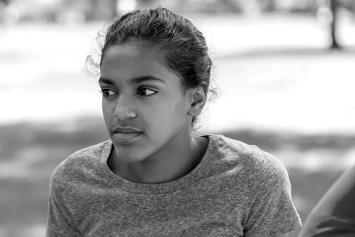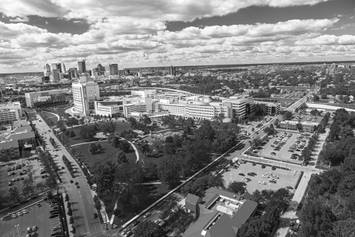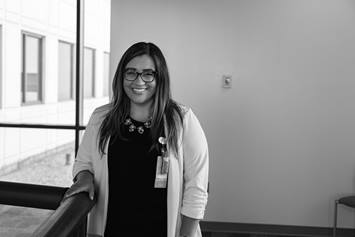Developmental Behavioral Pediatrics Fellowship
Developmental Behavioral Pediatrics Fellowship
The Developmental Behavioral Pediatrics Fellowship prepares pediatricians for an academic career in Developmental Behavioral Pediatrics.
Our developmental behavioral pediatrics fellowship program was established in 1984 and has been ACGME-accredited since 2003. The program is designed to prepare pediatricians for an academic career in developmental behavioral pediatrics through training in the identification and management of clinical conditions, the conduct of research, and the development of teaching and administration skills.
Upon successful completion of the program, fellows will have met training requirements for Developmental Behavioral Pediatrics certification by the American Board of Pediatrics.
Fellowship Program Goals:
- Clinical Care: To train DBP fellows to provide evidence-based, family-centered care for the diagnosis and treatment of developmental and behavioral conditions.
- Leadership: To prepare DBP fellows for leadership roles within the medical field.
- Advocacy: To provide training in systems-based practice to prepare DBP fellows to effectively advocate for children and families affected by developmental and behavioral conditions.
- Research: To train DBP fellows in research and quality improvement methods in order to inform innovative and evidence-based care for individuals with developmental and behavioral conditions.
- Teaching: To prepare DBP fellows to participate in the education of other healthcare providers and trainees regarding the behavioral, psychosocial, and developmental components of pediatric care in order to increase early identification of developmental and behavioral conditions and to improve care for children with these conditions.
- Reduce Health Disparities: To prepare DBP fellows to provide culturally/linguistically-competent care in order to reduce health disparities for individuals with developmental and behavioral conditions.
What You Need to Know
Why Developmental Behavioral Pediatrics?
Developmental and behavioral disorders are among the most common conditions in pediatrics. Developmental behavioral pediatricians are trained to consider both the medical and the psychosocial aspects of children’s development and behavior and are uniquely positioned to diagnose and manage these conditions. Developmental behavioral pediatricians must be competent in providing care both independently and within the context of interdisciplinary teams including psychologists, speech language pathologists, occupational therapists, physical therapists and a wide range of other medical specialists and disciplines. They work closely with parents and families as well as schools and other community agencies.
Conditions commonly managed by developmental behavioral pediatricians include:
- Anxiety disorders
- Attention deficit hyperactivity disorder
- Autism spectrum disorder
- Cerebral palsy
- Depression
- Disruptive behavior disorders (e.g. Oppositional defiant disorder)
- Genetic conditions (e.g. Down syndrome)
- Global developmental delay
- Intellectual disability
- Learning disabilities
- Myelomeningocele
- Sensory impairments
- Sequelae of prematurity and other adverse perinatal conditions
- Sleep disorders
- Speech and language disorders
Developmental Behavioral Pediatrics at Nationwide Children’s
- Mission: To achieve best outcomes for children with developmental and behavioral needs through evidence-based, family-centered, inter-professional practice
- Vision: All children achieve optimal developmental and behavioral health
Developmental Behavioral Pediatrics Nationally
- Society for Developmental Behavioral Pediatrics: www.sdbp.org
Patient Videos
- Life with Down Syndrome: Izzy’s Story
- Born with Spina Bifida: Blake’s Journey Home
- Living with Autism: Jackson’s Story
Patient Stories
- Hunter the Hero - Prematurity, autism
- Dmarion’s Story - Cerebral palsy, ADHD
- Grace’s Story - Spina bifida
- Izzy’s Story - Down syndrome
- Michael’s Journey - Caudal regression syndrome
- Giggles and Smiles – Grayson - William syndrome
- Grant’s Story - 22q deletion syndrome
- Our Miracle – Reed - CHARGE syndrome
- Kiera’s Story - OEIS Complex
Curriculum Overview
Subspecialty training in DBP requires at least 12 months total clinical time and 12 months total time on research/scholarly activity. The remaining 12 months can be structured based on the fellow’s interest and career goals. The general training timeline for our program is detailed below. There is flexibility to modify this timeline depending on the individual fellow’s specific interests and research project. In addition, fellows receive didactic instruction through a number of lecture series and case conferences throughout the three-year program.
First Year
- Developmental Behavioral Pediatrics Clinic: 6 months
- Child Development Center (Autism evaluations and medication management): 3 months
- Research: 2 - 3 months
- Other clinical experience: 0 - 1 month
Second Year
- Clinical experiences (core rotations and electives): 6 months
- Research: 6 months
- LEND: Weekly didactics throughout academic year, weekly Nisonger School-Aged Autism and Developmental Disabilities Clinic for 1 semester
Third Year
- Clinical experiences (core rotations and electives): 3 - 9 months
- Research: 3 - 9 months
Clinics and Programs
The primary goal of the clinical component of fellowship training is for fellows to develop competence in the diagnosis and management of developmental and behavioral conditions and in the provision of evidence-based interventions for individuals with these conditions. Developmental behavioral pediatricians must be competent in evaluating patients both independently and as a member of an interdisciplinary team.
Fellows receive training in a variety of settings including clinics within the Section of Developmental Behavioral Pediatrics, other specialty clinics at Nationwide Children's, clinics associated with the Nisonger Center at the The Ohio State University and community-based programs. These settings include a number of interdisciplinary teams and provide care covering the spectrum of developmental and behavioral conditions. Patients in these clinics range in age from infancy to adulthood.
Didactic Curriculum
The DBP fellowship curriculum is based on the content specifications and entrustable professional activities (EPAs) delineated by the American Board of Pediatrics (ABP) for the subspecialty of DBP and the program requirements for Graduate Medical Education in Developmental Behavioral Pediatrics from the ACGME.
Learn More About Our Didactic CurriculumScholarly Activity
Fellows are involved in a variety of scholarly and academic activities including research, quality improvement and teaching. There are also opportunities to complete a Master’s degree during this fellowship. Research is a key aspect of fellowship training in pediatric subspecialties. The American Board of Pediatrics requires that at least 12 months of the three-year program be focused on research/scholarly activity. At Nationwide Children's, DBP fellows typically spend three months of research in year one, six months in year two, and three to nine months in year three, depending on the project and fellow’s interests.
Meet Our Faculty and Fellows
Salary & Benefits
Fellows training in graduate medical education and dental education programs sponsored by Nationwide Children’s Hospital are employees of the hospital and as such are eligible the same benefits that other full time staff receive.
Research
Research education and training are vital to the mission of Nationwide Children's Hospital and The Abigail Wexner Research Institute at Nationwide Children's Hospital. As a top-ten free-standing pediatric research center and an academic affiliate of The Ohio State University, The Research Institute has an outstanding faculty, dedicated to training and mentoring the next generation of scientists in pediatric research.
Research at Nationwide Children's Hospital
Advocacy
Advocacy training fosters and encourages interest in child advocacy by early involvement and exposure to its many aspects such as addressing social determinants of health, community collaboration, health finance, health policy and legislative advocacy.
Application & Selection
Applicants for the Developmental/Behavioral Pediatrics Fellowship Program must be registered with National Resident Matching Program (NRMP) and should submit their application via Association of American Medical Colleges' Electronic Residency Application Service (ERAS). Applications must be submitted through ERAS; paper applications will not be accepted.
Applications are considered July through October of each year. Interviews are conducted August through October. The fellowship program commences each year on July 1. We encourage applicants to apply early in the application process to insure flexibility with interview scheduling.
Required application documents to be submitted via ERAS:
-
Complete ERAS Application
-
Medical School Transcript (certified English translation if from foreign institution)
-
Three letters of recommendation (more than three is optional)
-
Personal Statement
-
Current CV
-
USMLE transcript with scores to date
-
MSPE/Dean's Letter (Required for U.S. medical schools; provide if available for foreign medical schools)
-
Photograph for ERAS system (optional)
International Graduates
In accordance with Nationwide Children’s policy, foreign medical graduates must have a J1 VISA, which will require approval from the Designated Institutional Official and the Developmental Behavioral Pediatrics Program Director.
Questions
Please direct questions to Katherine Steingass, MD, Program Director at Katherine.Steingass@NationwideChildrens.org.
Fellowship at Nationwide Children's
- View all of the fellowship programs offered at Nationwide Children's
- Learn more about the educational resources offered to fellows
- Learn more about our commitment to recruitment and retaining a diverse workforce
- View our fellowship benefits
- Learn about life in Columbus, OH



